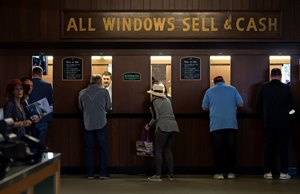Voters in California Turn Back Sports Betting Proposals


California voters shot down two sports betting initiatives Nov. 8, which would have permitted in-person betting at racetracks and tribal casinos, as well online sports wagering.
Current laws in the Golden State ban sports betting, roulette, and games with dice, according to the California legislature's office.
Types of gambling that are allowed include the state lottery, cardrooms, horse racing betting, and tribal casinos.
Proposition 26 aimed to legalize in-person betting at racetracks and tribal casinos. It would allow privately owned tracks and casinos to allow betting with the exclusion of high school and college games.
Mainstream tracks that would have been affected include Santa Anita Park, Los Alamitos, Del Mar, and Golden Gate Fields.

Millions of dollars went into supporting the campaign including support from multiple Native American tribes like the Pechanga Band of Luiseño Indians, Yocha Dehe Wintun Nation, Agua Caliente Band of Cahuilla Indians, Federated Indians of Graton Rancheria, and the Barona Band of Mission Indians.
The proposition would have required 10% of the bets made at racetracks each day to be paid to the California Sports Wagering Fund.
This money would be used first on education, with the remaining funds to be delegated between gambling addiction and mental health programs/grants, the cost of enforcing sports betting and gambling, and the general state fund.
An overwhelming 70.4% of Californians voted 'no' to the proposal, which was entitled on the ballot as 'Sports Wagering on Tribal Lands.' The other voters, 29.6% said 'yes.'
Another initiative was Proposition 27, which would allow tribes and gambling companies to offer sports betting online.
The proposal would allow such betting over the internet and on mobile devices including football games and some other non-athletic events but would ban betting on high school games as well as elections.
If it had passed, Prop 27 would have created a new fund with 10% of sports bets funneled to the California Online Sports Betting Trust Fund. Revenue would initially go to state regulatory costs and then would be dispersed between addressing homelessness and gambling addiction (85%) and for other tribes not involved in betting for government, economic, health, etc. (15%).
It was supported by companies like FanDuel, BetMGM, and DraftKings. The majority (83.3% of voters) filled in a 'no' on their ballots with the remaining 16.7% in favor.
